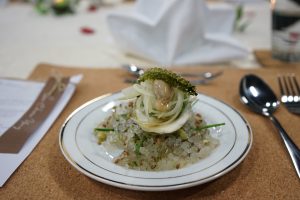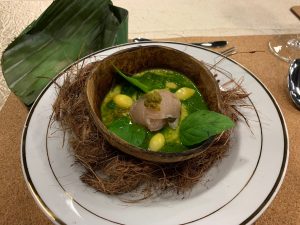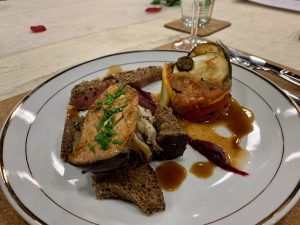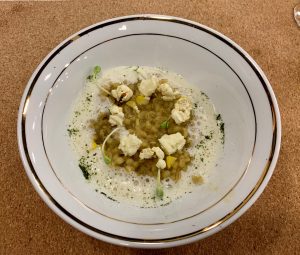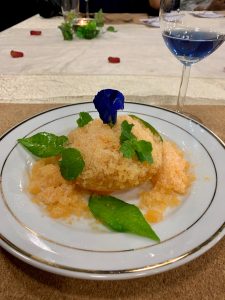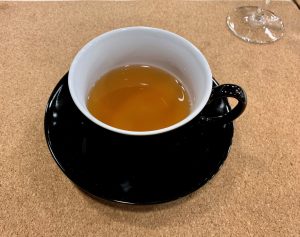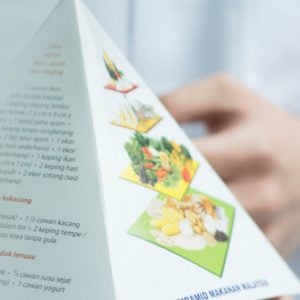One Friday night in December, excited student servers stood nervously to attention as the voices of their first dinner guests drifted into the Nutrition & Dietetics (N&D) Laboratory at the International Medical University (IMU). After months of hard work, the inaugural pilot supper club event called Project Aliquot was about to start! The normally functional food laboratory had been transformed into a beautifully decorated dining room. One long communal dinner table was set formally and dressed with table runners and small plants sourced by the students as a nod to nature which had been that evening’s inspiration. Upon entering, smartly dressed ushers led the guests to their seats which had been personalised with name cards. Once everyone had arrived, the Head Usher, Sharon welcomed everyone with a short introduction on the concept and mission of the supper club.
The 5 course meal began with an elegant 1st Course presentation of Oysters Kaeng Som. The locally farmed Penang oysters were accompanied by Petai Duri Omelette, Green Papaya, Sabahan Sea Grapes
| 2nd Course: Otak-Otak Cawanmushi |
|---|
| – Spiced Egg Custard, Betel Leaves, Spinanch, Kerisik Candlenut Pesto, Kombujime Spanish Mackerel |
| 3rd Course: Duck ala Cacao |
| – Bidor Duck Breast, Sg. Ruan Cacao Dukkah, Mulberry Puree, Ratatouille, Mushrooms de Provence & Duxelle, Homemade Sourdough, Vegetable Demi |
| 4th Course: Corn & Barley Ochazuke |
| – Barley & Sweet Corn Risotto, Corn Milk Bisque, Feta, Pop Corn, Baby Daikon |
| 5th Course: Melon 3 Ways |
| – Macerated Melon, Ebi Oboro, Melon Jelly, Melon Granita |
| Cocoa Tea |
| – Cocoa tea was served at the end (after the dessert) |
It wasn’t just all about delicious dining, Head Chef Leonard Yap and Head Usher, Sharon, educated their guests with details as to how each dish was prepared, as well as the nutritional benefits behind the locally sourced ingredients. Even the drinks served throughout that evening (a Pandan, lemongrass and lime infused tea colored by blue pea flowers) paid homage to Malaysian flavors and heritage. At the end of the meal, guests were surprised to discover that the entire 5 course meal contained just 700 calories and was low in sodium and high in fiber. The supper club truly embodied its name Project Aliquot. The word “Aliquot” meaning a portion of a larger whole, was an experiment in incorporating innovation, decadent flavours and healthy eating. It was the brainchild of Dietitian cum Chef Leonard Yap, Nutrition and Dietetics Alumnus and Prof Winnie Chee, Dean of School of Health Sciences , who devised an innovative concept to shake things up by way of an invitation only supper club, where students would prepare and serve a formal meal. They envisioned an elevated dining event where they could showcase how healthy food could be tasty, low in calories and sodium while promoting local Malaysian ingredients and purveyors. This is also part of the activities under the Center for Transformative Nutrition (CTNH) which IMU is setting up.
Prof Winnie says “A challenge that every programme faces is how lessons learned at school translate into real life practices in the marketplace post-graduation. We focus on how we can help our dietetics and nutrition students overcome prevailing stereotypes in order to promote that a healthy diet and nutritious food can be delicious to eat and fun to cook.”
It is no secret that healthy diets have been linked to improved emotional, physical and cognitive well-being. Awareness of healthier eating options along with the availability and access to nutritional education are leading more Malaysians to become increasingly savvy about the importance of adhering to a well-balanced diet as well as concern over the provenance of their food. In turn, restaurants and eateries are recognising the need to promote local ingredients and the social movement of “farm-to-table” in order to know how their product is grown and where it comes from. “Terroir”, which comes from the French word meaning “of the earth, soil” became the redefining point of food and nutrition for the team. Chef Leonard and his team of students spent an enormous amount of time foraging and sourcing local producers for sustainable ingredients that were native and unique to Malaysia. Together, they painstakingly planned and researched how various cooking techniques and execution could enhance the overall dining experience. After all, health conscious and delicious are not typically adjectives that are used together when describing most meals at restaurants. For Chef Leonard, Project Aliquot was a dream come true. He always wanted to create a “supper club to push boundaries of where healthy food can go, where dietetics could merge with the culinary sector.” He felt it was “important to provide the next generation of dietitians with more knowledge and practical skills in order to redefine food and showcase how healthy eating can be a part of daily life, making the point that “as the rate of NCD (non-communicable diseases like diabetes, heart attacks and high blood pressure) increases, it becomes very apparent that how we decide to eat and live plays a huge role in our health, not to mention where we get them from can also impact economies and the environment.” Preparing for the pilot supper club was an arduous lesson for the students in business as well as hospitality. The 16 Dietetics with Nutrition students were led by Chef Leonard in all aspects of the dining process, from ingredient sourcing, costing, business planning, to service and hospitality. They were given a crash course about the execution of a fine dining meal; from the seating arrangements and formal table setting known to industry insiders as “front of house” to course serving and timing in the kitchen, “back of house”.
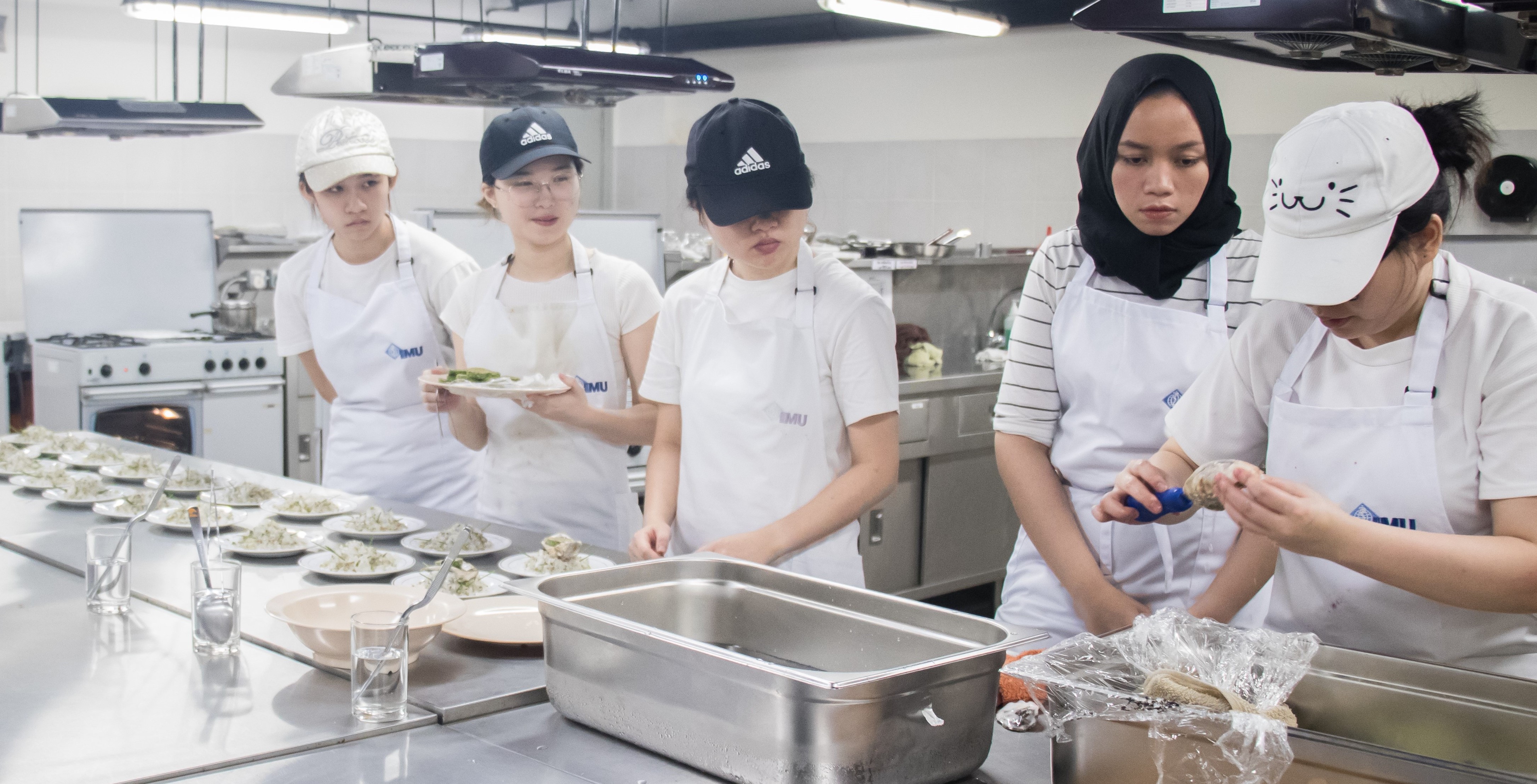
After the evening, Rohana, who worked the “back of house” described the experience as transformative, “Along with prep work, supplier contact and menu designing, we had classes. Along with classes, we had tests and exams. We were working non-stop for 2-3 months, ending in two nights of prep work and a third night for the actual pilot supper club. The worst thing was that the actual event night coincided with the toughest test of our semester. We managed to pull through. I learned to study way ahead and plan other responsibilities well. One needs to be really organised and disciplined. Also motivating myself was difficult, in a way that I am not a person who typically studies way ahead. But I just had to do it.” Another student, Yip Song Qing, who took on a “front of house” role in the project had her eyes opened to the importance of communication and commitment. She comments that, “Communication was important, we had a tight budget and we had to decorate the whole place. We had to look for suppliers to sponsor our décor and I had to know how to talk to them, how to make them feel good and supply their product. I am quite timid so I had to overcome that, to meet them face to face and negotiate effectively. I also had to commit to what we planned to do as a team. Everyone has their own task but it is up to you whether you want to finish your task and that’s it or if you want to do more and learn more like helping other team members.”
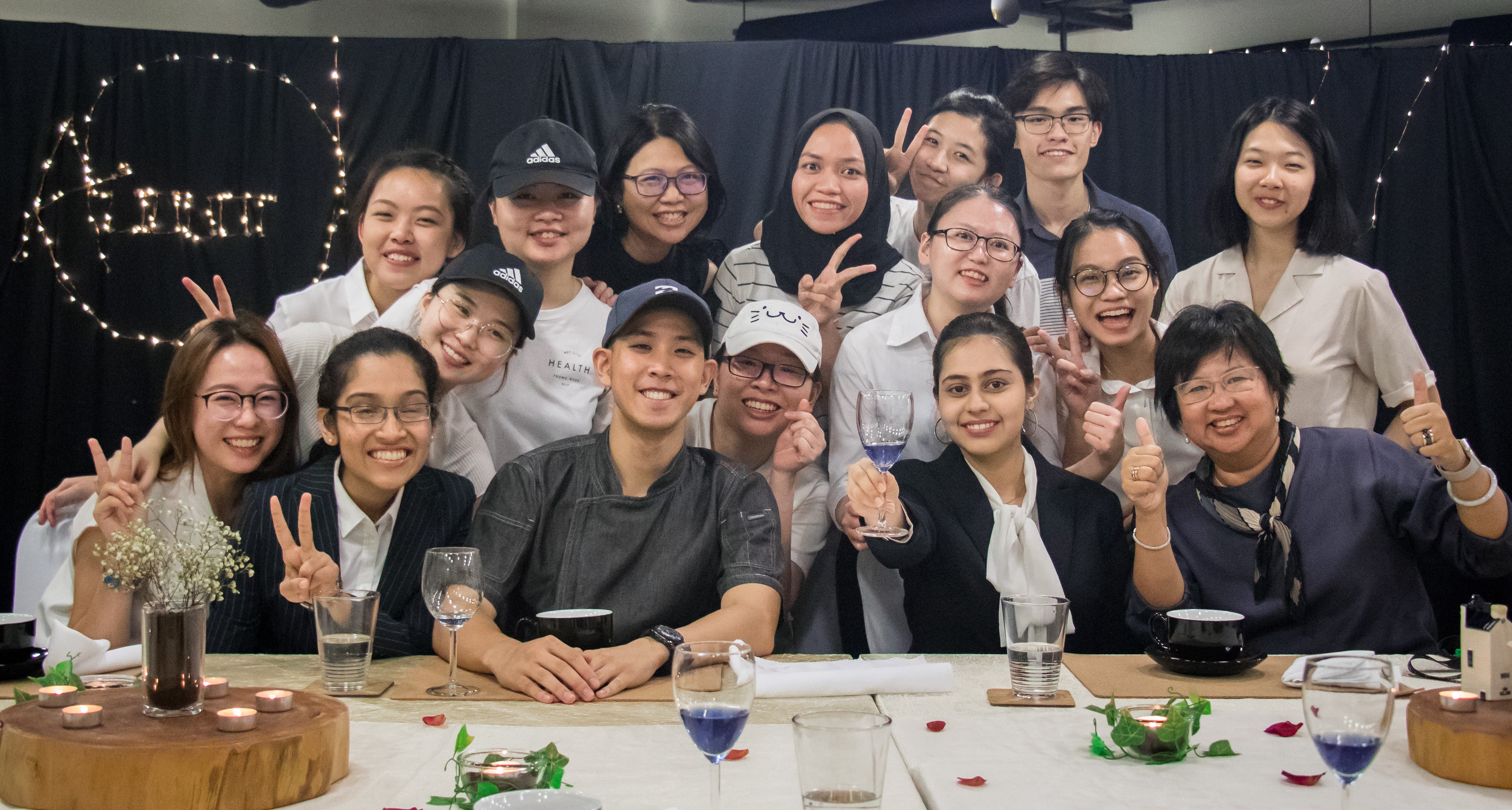
Clearly this was an event that resonated deeply with diners as well as the students. Project Aliquot 2.0 is currently underway with Song Qing and Rohana taking on leadership roles over a new team of students. Plans are in the works for regular weekend supper club events which just might change the way that people eat and think about food.
For more information on IMU’s future supperclub events, please check: https://www.facebook.com/ProjectAliquot or https://www.instagram.com/project_aliquot.





